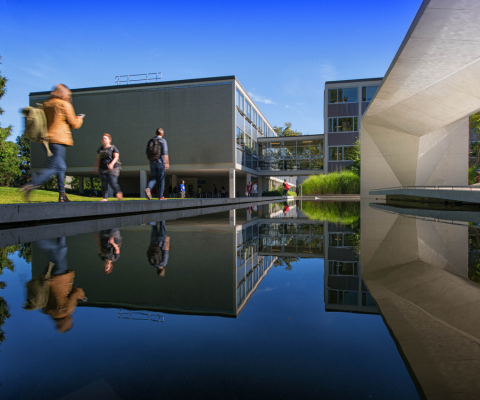Universities are a critical piece of the climate change puzzle

This op-ed was published in The Hill Times on September 27, 2023.
Reposted with permission from The Hill Times.
By Meric Gertler, president of the University of Toronto and chair of Universities Canada’s board of directors
From forest fires to heat waves, flooding to extreme storms, the impacts of climate change were all too real for Canadians this summer. While the fight to prevent and mitigate the effects of our warming climate may seem unwinnable, Canada’s universities are playing a critical role in helping the country address the climate crisis and find solutions.
Canada’s universities include over 70 research centres and institutes and thousands of researchers and graduate students exploring ways to mitigate and adapt to the impacts of climate change. At centres across the country, researchers are tracking climate change impacts on our systems and infrastructure and developing projections to help communities prepare for increases in temperature and extreme weather events.
The University of Toronto, for example, hosts the Climate Positive Energy Initiative—a centre for interdisciplinary clean energy research. There, experts in science, social science, engineering, economics and policy put their heads together to transform our energy systems. Some of the projects underway involve leveraging artificial intelligence to optimize energy efficiency in buildings, analyzing impacts of policies such as the carbon tax and exploring how bacteria can help consume or recycle waste.
Such research centres exist across Canada, from the University of Victoria’s Pacific Climate Impacts Consortium in the west to the University of PEI’s Canadian Centre for Climate Change and Adaptation in the east.
Universities are also key partners in supporting resiliency and adaptation efforts in their local communities. Many are working closely with municipal governments, local industry, community organizations and with each other to handle climate-related emergencies and help mitigate the impacts of future crises.
The Concordia University-led UNIVER/CITY 2030 initiative, for instance, brings together the City of Montreal and Montreal-based universities to map climate research capacity, develop a common R&D agenda, develop a climate data centre, create a local school for hands-on learning related to climate action and foster other forms of municipal-level systems change.
Universities, such as the University of Calgary and the University of Saskatchewan, are making an impact on climate by transforming their campuses into living labs. This type of research, conducted in practical, everyday conditions, accelerates the response to climate change by bringing together industry, scientists, students and other stakeholders to co-develop, test and assess sustainable technologies and practices.
For example, at Queen’s University, academic experts are working with industry partners to reduce emissions from concrete production, one of the highest carbon dioxide producing industries. The team is developing a low environmental impact structure to be used in future classrooms as a living lab to educate students.
Such living lab projects provide the next generation of students and researchers with the skills to succeed in a greener, low carbon economy. And they complement universities’ important initiatives to reduce the carbon footprint of their own operations. For example, U of T’s Project LEAP will reduce greenhouse gas emissions on our St. George campus by 60 percent before the end of this decade.
Universities are playing a critical role in addressing and preparing for the impacts of climate change, but it is clear more needs to be done. To support this work, Universities Canada, the national association representing 97 universities across the country, recently launched its new initiative: Canada’s universities: Action for net zero. The initiative brings a coordinated, national approach to universities’ climate work.
Canada’s universities are doing critical work to address the climate crisis. But to move the needle further, the federal government must make significant investments in university climate research and action, and ensure that universities are eligible for funding programs that help them accelerate their own emissions reductions. Canada’s universities are deploying their research talent and expertise to meet the climate crisis head-on.
About Universities Canada
Universities Canada is the voice of Canada’s universities at home and abroad, advancing higher education, research and innovation for the benefit of all Canadians.
Media contact:
Lisa Wallace
Assistant Director, Communications
Universities Canada
[email protected]
Tagged: Environmental sustainability




